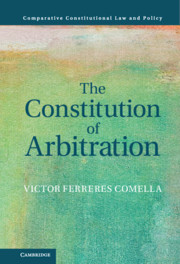Book contents
- The Constitution of Arbitration
- Comparative Constitutional Law and Policy
- The Constitution of Arbitration
- Copyright page
- Dedication
- Contents
- Acknowledgments
- Introduction
- Part I Arbitration and Private Law
- Part II Investment Treaty Arbitration
- Part III State-to-State Arbitration
- 10 The Arbitral Foundations of International Adjudication
- 11 The Virtues and Limitations of State-to-State Arbitration
- Afterword
- Index
Afterword
from Part III - State-to-State Arbitration
Published online by Cambridge University Press: 11 March 2021
- The Constitution of Arbitration
- Comparative Constitutional Law and Policy
- The Constitution of Arbitration
- Copyright page
- Dedication
- Contents
- Acknowledgments
- Introduction
- Part I Arbitration and Private Law
- Part II Investment Treaty Arbitration
- Part III State-to-State Arbitration
- 10 The Arbitral Foundations of International Adjudication
- 11 The Virtues and Limitations of State-to-State Arbitration
- Afterword
- Index
Summary
Throughout this book, we have explored various modalities of arbitration in a number of legal domains. Important differences have been noted. We have studied forms of arbitration involving disputes of a horizontal nature (private-law arbitration and state-to-state arbitration) and other forms that relate to controversies of a vertical character (investor-state arbitration). We have also paid attention to the presence or absence of courts in the background endowed with compulsory jurisdiction. While arbitrators dealing with domestic private law or international investment law do not operate in isolation, since local courts are otherwise empowered to handle cases, no such situation arises in the international sphere when states are in dispute. International adjudication, we have noted, retains an arbitral foundation, as no court can exercise jurisdiction unless its authority flows from the consent of the contending states.
- Type
- Chapter
- Information
- The Constitution of Arbitration , pp. 214 - 215Publisher: Cambridge University PressPrint publication year: 2021

